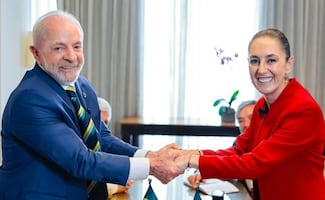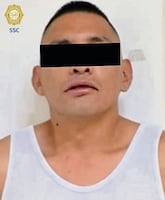There is an urgent need for international organizations to accept that when one person in the household is a torture victim , their relatives are victims too, said Mexican journalist Olivier Acuña Barba during his participation in the 67th session of the United Nations Committee Against Torture ( CAT ) in Geneva last week.
Acuña Barba
, a journalist since 1984, was arbitrarily detained and tortured by police officers in 2006 in the Mexican state of Sinaloa , where he spent two years in prison for a crime he did not commit , lost his home and possessions, has been separated from his family, and now lives in exile in Europe.
“In my case before the Inter-American Commission on Human Rights ( IACHR )—where he denounced the death threats against him and the harassment suffered by his family—the only one being considered a victim of torture is me. In all the other cases of torture I know of, it is the person detained or kidnapped who is being considered a victim of torture and not their children or spouses,” he stressed.
“Governments whose police or armed forces threaten, harass and ultimately, physically and verbally inflict cruel and unusual punishment upon a person should be made aware they are torturing the whole family and, therefore, destroying their lives,” declared Acuña Barba in his testimony obtained by EL UNIVERSAL in English .
Speaking to the CAT in a closed session due to the nature of his case as a survivor of torture , the journalist, who covered high-profile organised crime and human rights issues and has worked for news outlets such as Reforma , UPI , and Telesur , insisted that is considered by Mexican and international organizations as the only victim of torture , “when in fact my wife, daughter, and son too are survivors of the same crime .”
In the same vein, Acuña Barba pointed out that the families of his colleagues Óscar Rivera Inzunza and Javier Valdez Cárdenas , assassinated in 2007 and 2017 , also received death threats and nobody is doing anything to help them.
“ Their assassinations not only remain impune, but their families remain vulnerable, unprotected and without legal or human rights representation . I wish there was a way to give them justice, so they could have the closure they deserve,” he said.
In his testimony, Acuña Barba, represented since 2015 by the human rights organization Redress , disclosed that during his torture for around 16 hours by at least nine police agents in January 2006 he was subjected to waterboarding , suffocation , flattening , and beatings .
“And then, the worst happened… they told me they had my family in a room next door and that they would bring one by one into the room with me and torture them and kill them until I told them what they wanted to know,” he described.
Sign a statement
Sinaloa authorities accused Acuña Barba of being involved with the murder of a young man in the state capital of Culiacán and that he was hiding a weapon which belonged to the Attorney General’s office
. They took him to the Prosecutor’s Office and forced him to sign a statement.
Acuña Barba remained in prison for two years
, where he received further death threats and was held for a time in sections of the prison designated for those with mental illnesses. Following his acquittal and release in May 2008, he and his family were subjected to further harassment and threats, and he eventually fled Mexico .
His career has been permanently damaged. Nobody has been arrested or punished by the crimes committed against the journalist, who has undergone six expert medical examinations , most of which claim to comply with the Istanbul Protocol yet, in fact, demonstrate serious technical deficiencies.
Some of the medical reports were produced by experts working on behalf of the institutions accused of perpetrating the torture
. The majority of the reports present Acuña Barba in a negative light and deny that he was subjected to torture.
A medical report elaborated in 2018 by Dr. Pau Pérez-Sales, a World Psychiatric Association leading expert on the preparation of reports compliant with the Istanbul Protocol, concludes that the earlier medical reports lack the necessary objectivity and rigor to be expected in reports of this kind.
The report of Dr. Pérez-Sales concludes that Acuña Barba continues to suffer a severe post-traumatic stress disorder ( PTSD ) as a result of his torture .
The UN Committee Against Torture is the body of independent experts that monitors the implementation of the Convention Against Torture and Other Cruel, Inhuman and Degrading Treatment or Punishment , signed by Mexico in 1985.
Unfortunately, as Acuña Barba remarked, “ old ways and practices seem to die-hard ” despite the new government headed by President Andrés Manuel López Obrador .
“A clear indication of that, at least in my opinion, emerged right here, where scarcely three months ago Martha Delgado Peralta , the head of a 23-member Mexican government human rights delegation , on the one side admitted the situation in Mexico was not good, but immediately afterward questioned in disbelief the findings revealed by Diego Rodríguez Pinzón , the former CAT Rapporteur ,” he said.
In a “highly disappointing” reaction, Delgado Peralta , Mexican Undersecretary for Multilateral Affairs and Human Rights , accepted before a CAT session in April the “ enormous challenge ” of reducing and eradicating torture in the Latin American country ; however, she declared, “It is not something that we can solve in a few months.”
For his part, Rodríguez Pinzón highlighted the “ endemic situation ” of torture in Mexico that has not improved since the last CAT evaluation in 2012 . The UN rapporteur underscored the establishment of the General Law to Prevent, Investigate and Punish Torture and Other Cruel, Inhuman and Degrading Treatment or Punishment , yet it is important to fully implement it and there are outstanding issues for its implementation.
The government has not created special prosecutor offices in all the 32 Mexican states and no resources are allocated for the operation of the National Register of the Crime of Torture , said Rodríguez Pinzón.
According to the National Survey of People Deprived of Liberty ( ENPOL ) carried out by the federal government in 2016, 63% of detainees received physical violence during their detention , including violence against their relatives. Nevertheless, the ENPOL would not be carried out this year, he added, due to budget cuts.
Mexico is the second deadliest country for journalists after Afghanistan
, with a total of 11 murders in 2018, stated the International Federation of Journalists in their annual report.
On Monday, the Office of the UN High Commissioner for Human Rights ( UNHCHR ) in Mexico condemned the killing of three journalists in the week between July 30 and August 2 in the states of Morelos , Guerrero , and Veracruz , bringing the total number of journalists killed this year to 10.
In addition, the editorial office of the newspaper El Monitor de Parral in Chihuahua was attacked with Molotov cocktails .
“ The situation of journalists and human rights activists in Mexico remains a major concern . End [the impunity] would be the best prevention measure for people working in journalistic activity,” affirmed Jan Jarab , head of the UNHCHR office in the country.
Editing by Sofía Danis
More by Gabriel Moyssen
Noticias según tus intereses
[Publicidad]
[Publicidad]


















